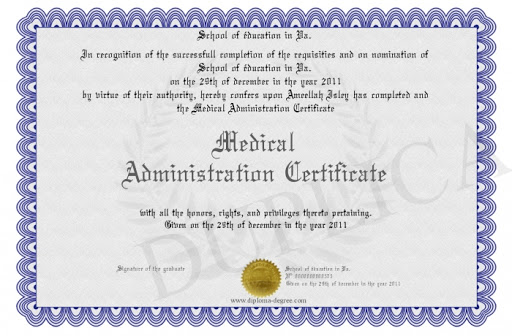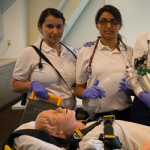What is a Healthcare Administrator?
A Healthcare Administrator is an umbrella term for someone who does all of the behind the scenes business type of stuff for hospitals and doctor’s offices.
You can find Healthcare Administrators handling employees, dealing with vendors, taking care of clients who may be having issues, or working with the budget.
As a Healthcare Administrator, you will be tasked with keeping on top of everything that happens in the areas of the hospital that only employees see, so you must be incredibly organized and able to work by yourself.
This career doesn’t deal with patients on a daily basis but still involves the medical field.
Duties
There are several things that a Healthcare Administrator must work on every single day.
Not only will you be required to attend meetings with doctors as well as other administrators and managers, as a Healthcare Administrator it is also your job to:
- Manage staff
- Manage patient care and experience
- Oversee the financial health of the company
- Ensure compliance with medical ethics and codes
- Manage policies for hiring, firing, and scheduling, etc.
- Budgeting
Salary
On average, a Healthcare Administrator in the United States makes around $101,340 a year.
In states like Arizona and California, Healthcare Administrators can make over $120,000 a year.
Healthcare Administrators who have many years of experience and certifications can make over $205,620 a year in some areas, like Washington D.C.
However, those that are just starting out in the career or who don’t have a certification or degree will typically make closer to $60,780 a year.
States with smaller populations have salaries closer to $96,000 a year, like Mississippi.
Having a Bachelor’s degree will significantly increase your salary, as well as earning any certifications.
Annually National Average Salary: $137,730
Average Annual Salary by State
| State | Avg. Annual Salary |
|---|---|
| Alabama | $101,790 |
| Alaska | $152,400 |
| Arizona | $140,700 |
| Arkansas | $101,000 |
| California | $154,620 |
| Connecticut | $143,750 |
| Delaware | $152,670 |
| District of Columbia | $176,520 |
| Florida | $128,580 |
| Georgia | $168,460 |
| Hawaii | $154,160 |
| Idaho | $124,660 |
| Illinois | $136,320 |
| Indiana | $115,850 |
| Iowa | $113,630 |
| Kansas | $118,980 |
| Kentucky | $115,790 |
| Louisiana | $114,770 |
| Maine | $131,940 |
| Maryland | $151,580 |
| Massachusetts | $159,680 |
| Michigan | $125,430 |
| Minnesota | $131,900 |
| Mississippi | $103,770 |
| Missouri | $117,920 |
| Montana | $121,160 |
| Nebraska | $125,130 |
| Nevada | $124,690 |
| New Hampshire | $155,990 |
| New Jersey | $169,520 |
| New Mexico | $136,140 |
| New York | $177,230 |
| North Carolina | $131,920 |
| North Dakota | $124,270 |
| Ohio | $124,740 |
| Oklahoma | $115,760 |
| Oregon | $158,230 |
| Pennsylvania | $120,560 |
| Rhode Island | $135,480 |
| South Carolina | $137,650 |
| South Dakota | $128,110 |
| Tennessee | $126,450 |
| Texas | $124,750 |
| Utah | $130,710 |
| Vermont | $148,020 |
| Virginia | $138,500 |
| Washington | $165,140 |
| West Virginia | $135,680 |
| Wisconsin | $144,940 |
| Wyoming | $113,700 |
| Guam | $102,190 |
| Puerto Rico | $98,420 |
| Virgin Islands | $94,450 |
Annual Average Salary: Top 5 States
The top earning state in the field is New York, where the average salary is $177,230.
These are the top 5 earning states in the field:
* Employment conditions in your area may vary.
How to Become a Healthcare Administrator
Step 1 Earn a Degree
In order to work as a Healthcare Administrator, you must have a Bachelor’s degree.
There are several different majors that are acceptable for this career choice.
These areas of expertise include:
- Health Services Management
- Healthcare Administration
- Business Administration
- Nursing Administration
An important note, make sure that the degree you are planning to obtain is accredited by the Association of United Programs in Health Administration.
A Bachelor’s degree can take around four years to full-time students, and anywhere from five to six years to part-time students.
It’s possible to even earn a degree in Healthcare Administration or one of the other majors, online.
Some of the classes you can expect in a typical Healthcare Administration program include:
- The US Healthcare System
- Healthcare Economics
- Health Laws and Ethics
- Operations Management
- Healthcare Information Systems
In order to be eligible to earn a Bachelor’s degree in one of these majors, you must have a high school diploma and a 2.5 GPA in most cases.
Step 2 Gain Work Experience
After graduating from a Bachelor’s degree program, it’s time to enter the workforce.
With this degree, it’s possible to gain an entry-level position in certain businesses and medical facilities.
Some of the places you may want to think about working include:
- Assisted Living Facilities
- Consulting Practice
- Colleges or Universities
- Emergency Medical Facilities
- Government Agencies
- Home Healthcare Facilities
There are so many options for someone who is interested in working as a Healthcare Administrator.
The great thing about this career is that you can jump around and find which niche you enjoy working in the most.
Gain a couple of years of experience, and then seek to become certified so that you can gain even bigger promotions or raises.
Step 3 Become Certified
Having a certification in any career sets you apart from the rest, but as a Healthcare Administrator, it is even more rewarding.
There are several types of certifications that a Healthcare Administrator can earn, some of the most influential are:
- Certified Medical Manager
- Certified Healthcare Administrative Professional
- Fellow of the American College of Healthcare Executives
- Certified Professional in Healthcare Risk Management
Each of these certifications has its own requirements, but the main focus is to gain experience in the field of Healthcare Administration before attempting certification.
Most certifications require at least two years of experience as a Healthcare Administrator.
It is also required to take an exam to gain any of these credentials, as well as many others not listed.
Step 4 Further Your Career
Certifications and experience can always help your career, but other things that you can do to accelerate your role as a Healthcare Administrator include:
- Earning a Masters degree
- Volunteer
- Work in different departments such as insurance underwriting, health information management, or as a nursing home administrator
For those who have earned a Masters degree or have begun looking for new careers may find employment in areas such as:
- Human Resource Management
- Administrative Services Management
- Health Insurance Specialist
- Training and Development Management
- Social and Community Services Management
No matter the role you take as a Healthcare Administrator or beyond, it’s important to gain leadership skills, have a keen eye for detail and become experienced with all different types of people.
Popular Programs
Education
Employers require Healthcare Administrators to have at least a Bachelors degree in Healthcare Administration or another closely related field like:
- Business Administration
- Nursing Administration
- Health Services Management
Having management and leadership skills is a must for this career.
Not only that, but many employers require technology skills and other knowledge like math and English.
Most Bachelor’s degrees cover the bases on all of these topics, as well as courses that are tailored to your specific major.
While a Bachelor’s degree can take about four years to finish for full-time students, two years of that is taking general education classes.
Most of the classes that you will take for your major in Healthcare Administration include:
- Evidence-Based Healthcare Administration and Literacy
- Legal and Ethical Issues in Healthcare Management
- Marketing for Healthcare Administration
- Health and Wellness Across Populations
In a Healthcare Services Management program, you can expect to take courses like:
- Medical Terminology
- Human Resources Management
- Healthcare Financing and Accounting
- Healthcare Management
Business Administration and Nursing Administration majors will typically have courses geared toward those niches and aren’t the best majors to pick if you are serious about becoming a Healthcare Administrator, though they will work in most facilities.
Once you earn a Bachelor’s degree and you have some experience in the field of Healthcare Administration, you may decide to earn a Master’s degree.
There are many types of Masters degrees out there, from online to accelerated programs.
Most Master’s degrees take about two years to finish and can help you to earn a higher salary or gain that promotion you are looking for.
A typical Master’s degree program in Healthcare Administration will have classes that are focused on leadership and management in the healthcare field.
Some of the classes that can be expected in this type of program are:
- Epidemiology and Health Planning
- Healthcare Financial Management
- Healthcare Strategies
- Healthcare Information Systems
It’s also possible to specialize in a specific area of Healthcare Administration, such as:
- Acute care
- Long term care
- Environmental health science
- Maternal and child health
There are many career paths that a Healthcare Administrator can take after earning a Master’s degree.
Look forward to a career as:
- Medical and health service manager
- Administrative service manager
- Healthcare social worker
Video About The Career
Certification
Working in the healthcare industry can be very lucrative for Healthcare Administrators, especially if they choose to earn certifications.
There are many certifications that are available in this career, which are completely voluntary.
However, employers like to hire those with certification over Healthcare Administrators with fewer credentials.
Some of the certifications that you can earn as a Healthcare Administrator are:
- Certified Medical Manager
- Certified Healthcare Financial Professional
- Certified Professional in Healthcare Quality
- Certified Healthcare Access Manager
Other certifications can be found through the American Association of Healthcare Risk Management or the Association of Healthcare Administrative Professionals.
There are separate requirements for each of the certifications, so make sure you research the one that you are interested in.
The Certified Medical Manager certification requires applicants to have a minimum of two years of job experience as well as twelve college credit hours in healthcare or business management.
In order to earn this credential, you must take a 200-question multiple-choice exam that will test your knowledge on:
- Human resources
- Finances
- Risk management
- Patient clinical education
- Business Management
The Certified Healthcare Financial Professional certification requires that you have experience in the financial sector of a healthcare facility.
In order to earn this certification, you must take the Business of Healthcare Program online and complete an exam.
The Certified Professional in Healthcare Quality certification is for anyone who works as a Healthcare Administrator.
You must pass an exam in order to be awarded this credential, expect to find subjects like:
- Organizational leadership
- Patient safety
- Performance and process improvement
- Health data analytics
As a Certified Healthcare Access Manager, you must have at least two years of experience as a manager in a healthcare facility.
You will also need to have a referral from your coworkers, supervisor, and course instructors.
In order to earn this certification, an exam must be taken as well.
This exam is about 115 questions and can take up to three hours to finish.
The exam tests you on your knowledge of front-of-house experiences in the healthcare system.
This includes checking the patients in, helping them with registration, and checking them out when they are finished.
There are so many certifications to be gained as a Healthcare Administrator, you will always have something to look forward to.
Certification Example:

Average Training Program Duration: 4+ Years
Most trainings gained working as a Healthcare Administrator comes from on the job experience.
There are some training programs that will lead students through the ins and outs of business and Healthcare Administration, and these can take about a year to complete.
However, for most Healthcare Administrators who want further education, earning a Bachelor’s degree is the most appropriate.
This can take around four years to complete.
A Bachelor’s degree can set up Healthcare Administrators for entry-level positions in most healthcare facilities.
Job Outlook
Having a career as a Healthcare Administrator could be very promising.
This career looks to potentially grow around 32 percent over the next ten years.
This is quite a bit more than many other careers in this same field, the reason for this rise is that the baby boomer generation is growing older.
This generation aging-up will create more need for medical attention, as well as increase job opportunities when they retire from the workforce.
Healthcare Administrators who are good with technology and can adapt to new and changing healthcare systems will have the best chances in this career.
Employment Growth Projection: 29%
2023
2033
That's a higher than average projected growth of 160,600
Should You Become a Healthcare Administrator?
Overall Satisfaction: High

Healthcare Administrators working today find their careers to be quite enjoyable.
The reason for this satisfaction is that they feel they are making a positive difference in people’s lives.
Having so many roles as a Healthcare Administrator can be scary but being well-organized is key to making in this career.
There are several different areas to work in as a Healthcare Administrator, which can add to how enjoyable the job can be.
People that are interested in a career as a Healthcare Administrator can expect to find job opportunities in:
- Doctor’s offices
- Pharmaceutical companies
- Health insurance companies
- Nonprofit organizations
Healthcare Administrators who have had success in the role say that it is a good career because of the ability to gain promotions as well as the variety in daily duties.
Average Salary: High

It can be very lucrative to work as a Healthcare Administrator in the United States.
Starting out, it’s likely that you will make around $60,780 a year, however not long after you could be making nearly $100,000 in some areas.
The average Healthcare Administrator makes around $101,340 a year.
This is after two or more years of work experience but having even more practice as well as certifications or other specialties can provide an even larger salary, at around $205,620 a year in some areas of the United States.
Job Growth Outlook: High

Healthcare Administrators will see a rise in career opportunities over the next decade.
This is due to the baby boomer generation growing older, they are retiring and creating more jobs for incoming Healthcare Administrators.
Not only that, but the need for more medical care from this generation will create a bigger need for Healthcare Administrators.
As a result, this career will rise by about 32 percent by 2028, which is much higher than many other careers in the healthcare field.
If you are looking to start a career as a Healthcare Administrator, now is the time to take your first steps.
Education Duration: 4+ Years

In order to work as a Healthcare Administrator in most facilities across the United States, you must have at least a Bachelor’s degree.
On average, a Bachelor’s degree takes around four years to finish for full-time students.
After you gain a Bachelor’s degree, you may want to think about earning a Master’s degree in Healthcare Administration or an equivalent.
This can take another two years to finish.
All in all, it can take anywhere from 4 to 6 years to become a Healthcare Administrator.
Personal Skills Needed

Not everyone will succeed in the role of a Healthcare Administrator.
You must be well-organized and good on your toes, but there are some other qualities that go great with this career.
These personal skills include:
- Empathy
- Active listening skills
- Leadership skills
- Conflict resolution skills
- Project management abilities
- Decision-making skills
- Ability to think critically
- Good math and budgeting skills
- Patience
- Ability to wear many hats at once
- Healthcare knowledge
- Medical terminology knowledge
There are many sides to a Healthcare Administrator, which means you must be well-balanced and able to work in many different areas of the healthcare field.
Frequently Asked Questions
What is the average salary of a Healthcare Administrator?
Most Healthcare Administrators in the United States can make quite a bit of money, at around $101,340 a year on average.
Those that are just starting out as Healthcare Administrators will likely make a bit less, at $60,780 a year in some areas.
However, with certifications and many years of experience, it’s possible to earn over $205,620 a year as a Healthcare Administrator.
Some areas of the United States have higher salaries, like California and Washington, while smaller states and less populated states pay their Healthcare Administrators a little less.
How long does it take to become a Healthcare Administrator?
For now, it’s not legally required to have a Bachelor’s degree in order to work as a Healthcare Administrator, however, most employers expect it.
This is because a Bachelor’s degree shows employers, as well as clients and patients, that you are competent in your career.
The average Bachelor’s degree takes around four years to complete, and after two years of experience working as a Healthcare Administrator, you can become certified.
This means that it can take anywhere from four to six years to become a Healthcare Administrator.
What does a Healthcare Administrator do?
You could say that a Healthcare Administrator is a jack of all trades.
This is because they are tasked with making sure all of the fronts of the house business gets taken care of in a hospital or other medical facility.
A Healthcare Administrator works with employees, customers, and patients in order to keep everyone safe and happy.
They may work on scheduling, budgeting, customer service, and many other duties throughout the day.
What is the demand for Healthcare Administrators?
It seems that there will be a need for Healthcare Administrators for many years to come.
Over the next decade, this career will rise around 32 percent, which is outstanding compared to other careers in the healthcare field.
Most of the job opportunities are coming from the baby boomer generation, who are growing older and retiring, making room for a new generation of Healthcare Administrators.
That same generation is going to start needing more medical attention as well, which will cause the spike.
How much does it cost to become a Healthcare Administrator?
On average, a Bachelor’s degree in the United States costs around $25,000.
That’s for a typical public university, if you attend a private school you may pay more than $50,000 to become a Healthcare Administrator.
It’s possible to earn a Master’s degree for this career as well, which can cost another $50,000 to complete.
In total, becoming a Healthcare Administrator can cost anywhere from $25,000 to $100,000 depending on where you go to school.
 Healthcare Administrator Info by State
Healthcare Administrator Info by State

- Alabama
- Alaska
- Arizona
- Arkansas
- California
- Colorado
- Connecticut
- Delaware
- Florida
- Georgia
- Hawaii
- Idaho
- Illinois
- Indiana
- Iowa
- Kansas
- Kentucky
- Louisiana
- Maine
- Maryland
- Massachusetts
- Michigan
- Minnesota
- Mississippi
- Missouri
- Montana
- Nebraska
- Nevada
- New Hampshire
- New Jersey
- New Mexico
- New York
- North Carolina
- North Dakota
- Ohio
- Oklahoma
- Oregon
- Pennsylvania
- Rhode Island
- South Carolina
- South Dakota
- Tennessee
- Texas
- Utah
- Vermont
- Virginia
- Washington
- West Virginia
- Wisconsin
- Wyoming
Healthcare Administrator Resources
- 14 Pros and Cons of Being a Healthcare Administrator
- A Day in the Life of an Assisted Living Administrator
- Are there 100 Percent Online Healthcare MBA Programs?
- Are There Any 100 Percent Online MHA Programs?
- Are there Licensed Nursing Home Administrator (LNHA) Certification Programs?
- Are there Online MHA Programs that Waive or Do Not Require the GRE?
- Are There Online MS in Healthcare Informatics (MSHI) Degrees That Do Not Require the GRE?
- Best Healthcare Administration Certifications (2020)
- Clinical Research Associate (CRA) – A Day in the Life
- Compliance Director – Education, Certification & Daily Responsibilities
- Fully Online Master’s Degree Programs in Health Informatics (MSHI)
- Guide to Part-Time MHA Programs – Duration, Eligibility, Coursework & Tuition
- How Much Does Healthcare Administrator School Cost?
- No GMAT Online Healthcare MBA Programs: Which Ones Waive the GMAT Requirement?
- Nursing Home Executive Director – A Day in the Life
- One-Year MHA Programs Online
- Online MSN in Nursing Administration Programs – No-GRE
- Part-Time Online Healthcare Informatics Degrees (MSHI Programs)
- Part-Time Online Healthcare MBA Programs
- What are Executive MHA Programs?
- What is a Master of Healthcare Administration (MHA) Degree?
- Which MHA Program Specializations are Available Online?
More Medical Careers
| Career | |
|---|---|
 | Certified Nursing Assistant Working as a Certified Nursing Assistant is an entry-level role that will give you hands-on experience when you are ready to take the next step in your medical career. |
 | Dental Assistant Dental assistants help dentists to provide patient care, keep records, and care for the dental equipment. |
 | Dental Hygienist Dental hygienists take care of cleaning teeth to promote hygiene and help avoid cavities and gum problems. |
 | Dialysis Technician Dialysis technicians maintain and monitor dialysis equipment, and also act as primary caregivers for patients undergoing dialysis treatment. |
 | Dog Groomer Dog groomers attend to grooming dogs, usually at dog salons or big pet-related chain stores. |
 | Home Health Aide Home health aides provide home care to individuals who require assistance in their day-to-day living. |
 | Licensed Practical Nurse (LPN) Licensed Practical Nurses provide basic nursing care to patients and work with Registered Nurses and Doctors. |
 | Medical Assistant Medical assistants support the work of physicians, nurses, and other health professionals. |
 | Medical Biller and Coder Medical billers and coders manage, organize, and code various health information data. |
 | Medical Technologist Medical laboratory technologists collect bodily samples and conduct tests to analyze those samples. |
 | Medical Transcriptionist Medical transcriptionists go over voice recordings to convert them into written texts. |
 | Nutritionist As a Nutritionist, you’ll be tasked with creating meal plans, counseling, and understanding dietary restrictions for all types of clients. |
 | Patient Access Representative The work involves helping people to orient themselves to the space and everything that is going on. |
 | Patient Care Technician Patient care techs work directly with patients helping them with daily activities and assist the medical staff by measuring and monitoring the patients' vital signs among other tasks. |
 | Pharmacy Technician Pharmacy technicians provide patients with medications through prescription or over the counter. |
 | Phlebotomist As a Phlebotomist, it will be your responsibility to take blood samples from patients and send them to the lab for further testing. |
 | Physical Therapist Assistant Physical therapist assistants provide physical therapy services to patients and aide to physical therapists. |
 | Professional Recovery Coach A professional recovery coach is a life coach who works with someone during their addiction recovery process. |
 | Radiation Therapist Allied health provisional who specializes in radiation oncology treatments. |
 | Registered Health Information Technician Registered Health Information Technician (RHIT) help store and verify accuracy of health records as well as analyze patient data. |
 | Registered Nurse (RN) Registered Nurses provide hands-on patient care in various settings, mainly hospitals, and clinics. |
 | Respiratory Therapist Respiratory therapists treat and care for patients who experience breathing difficulties. |
 | Sterile Processing Technician A sterile processing technician is a healthcare professional who is responsible for preparing, sterilizing, maintaining, packaging, and storing medical tools and equipment used in surgical and other medical procedures. |
 | Surgical Technologist Surgical technologists – also known as operating room techs – prepare operating rooms and assist doctors and nurses during surgical procedures. |
 | Vet Office Manager Veterinary office managers work to make sure that the daily operations run smoothly and efficiently at veterinary hospitals or veterinary clinics. |
 | Veterinary Assistant Veterinary Assistants work closely with Veterinarians to handle routine animal care. |
 | Veterinary Technician Veterinary Technicians assist veterinarians as well as diagnosing and treating animals, mostly in private clinics. |
 | EKG Technician EKG technicians test and monitor the cardiovascular system. |
 | EMT Trained emergency medical technician that arrives at the scene to provide medical services such as resuscitation. |
 | MRI Technologist MRI Technologists use a machine to scan the body and create a detailed image of the inside for doctors to analyze. |
 | Optician Opticians are technicians and salespersons at the same time who spends most of their day talking to customers, reading prescriptions written by doctors, and dispensing glasses and lenses. |
 | Ultrasound Technician Ultrasound technicians aid physicians in monitoring and diagnosing patients through the use of ultrasonic imaging technology. |
 | X-Ray Technician X-Ray Technicians are medical imaging professionals who use technology to visualize the inside of our bodies. |














